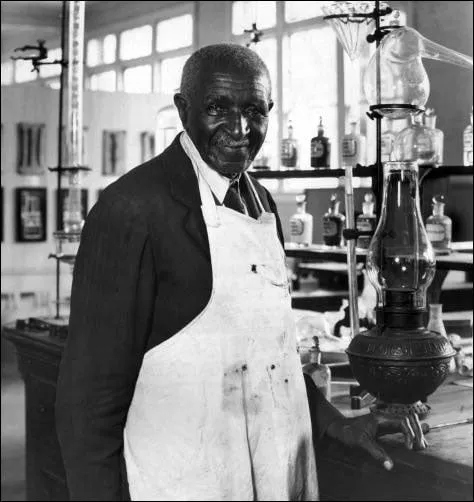
George Washington Carver
Junious Ricardo Stanton
In the mid to latter part of the twentieth century in the US you could rarely go to a city or county in the South that didn’t have a school named after George Washington Carver. Even during the days of virulent racial oppression and caste, George Washington Carver was viewed as “a credit to his race” and famous scientist who single-handedly saved Southern agriculture. Today many Black people and Euro-Americans don’t even know who George Washington Carver was. So as part of this year’s Black History articles I will share a bit of Carver’s personal and professional history, genius and accomplishments.
The exact date of George Washington Carver’s birth is not known. It is surmised he was born between 1863-1865 in Diamond Missouri during the formal enslavement era. He was born into servitude, into a large family. His parents were “owned” by a man named Moses Carver. His family was given the surname of the White man who owned them, Carver. Before he was born George’s father died in an accident. As an infant George suffered several traumatic experiences. When he was only a few days old, George along with his mother and a sister were kidnapped by raiders and transported to Kentucky. Only George was found and retrieved by an agent working on behalf of Moses Carver. This was the norm during enslavement; “owners” would pay “agents”, trackers aka slave catchers to trail and retrieve their “property” as part of the federal government's Fugitive Slave Act.
When Carver was returned to Moses Carver’s farm he had no parents. His father had died before George was born and the trackers weren’t able to recapture his mother and sister so George and another brother James were raised by Moses Carver and his wife Susan.
George was a sickly boy so he was spared the hard work in the fields even after the War Between the States was over. Early on he developed a fascination with plants and herbs while living with the Carvers working in Mrs. Carver’s garden. Moses and Susan Carver also taught young George and his brother how to read and write.
George unlike many of his peers was able to attend school. He was sent to an all Black school in Neosho Missouri where he lived with a Black couple named Andrew and Mariah Watkins. He learned more about plants living and working for and with them but he subsequently left Neosho and migrated to Kansas. He completed high school in Kansas, applied to and was accepted at a White college that rejected him once they discovered he was Black. He applied to, was accepted and attended a college in Iowa, Simpson College, where he studied art and music but later transferred to and graduated from Iowa State Agricultural School now known as Iowa State University. Carver studied botany earning a Bachelor’s Degree in 1894, the first African American to do so. Carver remained at Iowa State Agricultural School earning a Master’s Degree in Agricultural Science in 1896. He taught at the college once again he was the first Black to do so.
Booker T. Washington was looking for science teachers for his Tuskegee Normal and Industrial Institute in Alabama. In 1896 Booker T. Washington heard about George Washington Carver and recruited him to come to Tuskegee. There Carver spent his life teaching, researching, becoming a world renowned innovator, inventor and highly respected scientist.
Carver focused on service providing practical education and information to the rural Blacks in Alabama. Under Carver’s tutelage Tuskegee initiated mobile agricultural education programs, hands on demonstrations in the local communities to teach farming and animal husbandry skills to rural farmers. Using his research and ideas Carver showed the farmers how to use crop rotation to replenish the soil because exclusive cotton planting was depleting the nutrients in the soil. Carver used what he learned and taught at his Tuskegee teaching laboratory to help farmers increase the yields on their cotton crops by alternating planting cotton with soil improvement crops like soybeans, sweet potatoes and peanuts. He expanded the mobile outreach to offer midwifery, family hygiene with nurses to help educate and service rural Alabama communities.
Alabama farmers’ most profitable crop was cotton and many of them were leery of Carver’s instruction to plant soybeans, sweet potatoes and peanuts. Carver meanwhile was hard at work discovering new products that could be developed from those crops. Carver discovered and developed over three hundred products and new uses for those alternative crops which allowed the farmers to profit from his discoveries and save Southern agriculture in the process.
Carvers work and success brought him to the attention of government officials and industrialists like Henry Ford and Thomas A. Edison. Carver was often invited to Washington D.C. to testify before Congress or as a speaker at important policy meetings and educational seminars. His work benefited the whole nation not just Alabama!
George Washington Carver’s research saved Southern agriculture from self-destruction and in the process created new markets for plants many ignored, took for granted or failed to recognize their potential. Carver was not bitter about the racial caste and oppression he experienced during his life. He had an extremely positive philosophy about life. One of his many quotes about living and life was, “When you can do the common things of life in an uncommon way, you will command the attention of the world.” Carver explained his success this way, “God is going to reveal to us things He never revealed before if we put our hands in His. No books ever go into my laboratory. The thing I am to do and the way of doing it are revealed to me. I never have to grope for methods. The method is revealed to me the moment I am inspired to create something new. Without God to draw aside the curtain I would be helpless.” During his life, Carver overcame obstacles and barriers and ended up a highly respected scientists during an era of virulent racial animus and terror.
Carver discovered hundreds of uses for peanuts, soybeans and sweet potatoes as food, commercial and industrial products such as cooking oils, milk, soaps, cosmetics, medicines, dyes, paints, paper, and alternatives to silk and rubber. Prior to Carver arriving on Tuskegee’s campus in 1896 the peanut wasn’t even recognized as a bona fide US crop; but thanks to Carver by 1940 the lowly peanut was ranked number six and had become the second leading cash crop in the South behind cotton!
For all of his accomplishments and recognition George Washington Carver has a mild mannered humble and deeply spiritual man. He prayed and meditated and said the plants spoke to him and shared their secrets. Carver eschewed the spotlight and remained committed to serving his people using botany and chemistry to make a tremendous impact where he was. He turned down lucrative requests from Henry Ford and Thomas Edison to work with them. He only owned a few patents on his discoveries, he allowed others to take credit for his research and work.
What can we take from the life of this genius? My take-away is: cultivate our innate gifts, follow your passion, be committed, stay single minded and focused, remain humble and appreciative of your successes. My family owes a deep gratitude to George Washington Carver. On my paternal side my ancestors owned land and were peanut farmers (along with corn, soybeans and other crops) in Southampton County Virginia from the late 1870’s to the present. Thank you Dr. Carver!
-30-
 Posted By: Junious Stanton
Posted By: Junious Stanton
Thursday, February 8th 2024 at 11:37AM
You can also
click
here to view all posts by this author...